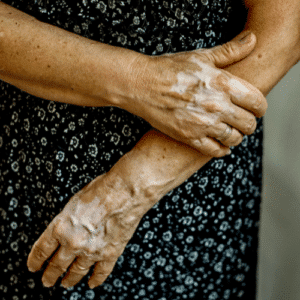Understanding the Different Types of Vitiligo
Vitiligo is one of the most misunderstood autoimmune skin disorders, affecting an estimated 2.8 million people in the United States. Even so, few people understand what vitiligo is, how it affects more than just your skin, and what treatments are available for treating the visible and invisible symptoms of it.
At Florida Academic Dermatology Center, we’re dedicated to educating the public and providing effective treatment for vitiligo and all other skin conditions. Let’s break down everything you need to know about vitiligo.
The Autoimmune Disorder That Attacks the Skin
Most people understand that vitiligo is a disease that causes patches of white or lighter-toned skin to form. This happens because the immune system incorrectly identifies pigment-creating cells called melanocytes as harmful foreign bodies. The immune system then activates, attacking and destroying these skin cells and stripping the skin of its pigment.
Because vitiligo is a malfunction of the immune system, patients with this skin disorder are more likely to develop other autoimmune conditions like:

- Addison’s disease
- anemia
- lupus
- psoriasis
- thyroid disease
- rheumatoid arthritis
- inflammatory bowel disease
- systemic lupus erythematosus
- type 1 diabetes mellitus
While vitiligo affects people of all ethnic and racial backgrounds, it is typically more visible on darker skin tones. This is why it is most commonly associated with people of color, particularly those with African or Middle Eastern backgrounds. Most commonly pigment loss begins on the hands, arms, feet, or face, but these aren’t the only areas vitiligo can affect.
The 7 Types of Vitiligo
Most people have no idea that vitiligo is an umbrella term that includes 7 subtypes of the autoimmune disorder. They are:
Generalized Vitiligo: This is the most common type of vitiligo, generalized vitiligo causes macules (small clusters of pigment loss) to appear in various places on your body.
Segmental Vitiligo: This type of vitiligo is more regional, affecting one side or one area of the body, such as your hands or face.
Mucosal Vitiligo: Mucosal vitiligo may be less immediately apparent because it affects the mucous membranes of your mouth and/or genitals.
Focal Vitiligo: Focal vitiligo is rare and manifests as centralized macules in a small area that don’t spread within one to two years.
Trichome Vitiligo: This type causes a bullseye pattern to form on the skin: a white or colorless center, then an area of lighter pigmentation, and an area of your natural skin tone.
Universal Vitiligo: This rare type of vitiligo causes more than 80% of your skin not to have pigment. It is not the same thing as albinism, which affects the body’s melanin production rather than destroying melanin-producing cells.
Vitiligo Treatments and Prevention
As a genetic condition that may be hereditary, there is no current preventative treatment for vitiligo. If your family has a history of vitiligo, however, these lifestyle changes may help to prevent significant pigment loss:
- Use sunscreen and protective clothing to prevent sun damage
- Never use a tanning bed or sunlamp
- Try to avoid skin injuries like cuts, scrapes, and burns
- Consider taking immune-supportive supplements
- Eat a balanced, nutritious diet and minimize stress
If you have already noticed the effects of vitiligo, available treatments can help slow or reduce its spread and may assist with pigment restoration. Medications like Corticosteroids, JAK inhibitors, and certain creams and topical ointments may effectively reduce the appearance of white or lighter-toned patches.
However, it’s important to note that results take time and, as an autoimmune response, vitiligo can be resistant to treatment. Patience is key for attaining long-term results. In the meantime, cosmetic products and self-tanning lotions may help to conceal affected areas and provide a more even-looking complexion.
If you’re experiencing bothersome pigmentation loss caused by vitiligo or another skin condition, Florida Academic Dermatology Center can help. Call us at (305) 324-2110, or use our convenient online scheduler to book an appointment now!